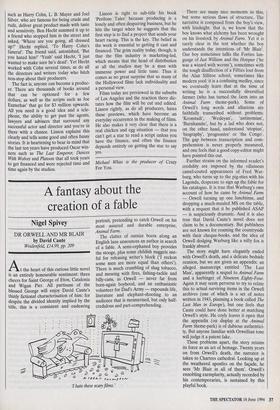A fantasy about the creation of a fable
Nigel Spivey
DR ORWELL AND MR BLAIR by David Caute Weidenfeld, £14.99, pp. 209 A, the heart of this curious little novel is an entirely honourable sentiment: three cheers for Saint George of Eton, Catalonia and Wigan Pier. All partisans of the blessed George will enjoy David Caute's thinly fictional characterisation of him: for despite the divided identity implied by the title, this is a consistent and endearing portrait, pretending to catch Orwell on his most assured and durable enterprise, Animal Farm.
The clatter of outsize boots along an English lane announces an author in search of a fable. A semi-orphaned boy provides the stooge, plus some childish nuggets use- ful for releasing writer's block (`I reckon some men are more equal than others'). There is much crumbling of shag tobacco, and messing with fires, fishing-tackle and billy-cans, as Orwell — never far from born-again boyhood, and an enthusiastic volunteer for Dad's Army — expounds life, literature and elephant-shooting to an audience that is mesmerised, but only half- credulous and part-comprehending.
`I hate these scaly films.' There are many nice moments in this, but some serious flaws of structure. The narrative is composed from the boy's view, with hindsight: that is, we know that the boy knows what alchemy has been wrought on his livestock by Animal Farm. Yet it is rarely clear in the text whether the boy understands the intentions of 'Mr Blair'.
Our boy sometimes talks the Forties lan- guage of Just William and the Hotspur (`he was a wizard with worms'), sometimes with the tough disaffection of a Fifties lout from the Alan Sillitoe school, sometimes like modern yoof: it is a confusing medley, since we eventually learn that at the time of writing he is a successfully diversified farmer (who has turned the farm into an Animal Farm theme-park). Some of Orwell's long words and allusions are faithfully transcribed without problems: `Kronstadf, 'Wesleyan', `antinomian', `Burnhamite', but by a lad who does not, on the other hand, understand 'utopian', `biography', 'progressive' or 'the Congo'. The gap between transcription and com- prehension is never properly measured, and one feels that a good copy-editor might have pointed this out.
Further strains on the informed reader's credulity are imposed by the villainous camel-coated appearances of Fred War- burg, who turns up to the pig-sties with his Lagonda, desperate to sign up the fable for his catalogue. It is true that Warburg's own account of how he came by Animal Farm — Orwell turning up one lunchtime, and dropping a much-mauled MS on the table, with a request that it be published ASAP — is suspiciously dramatic. And it is also true that David Caute's novel does not claim to be a documentary. But publishers are not known for roaming the countryside with their cheque-books, and the idea of Orwell dodging Warburg like a nifty fox is frankly absurd.
The story might have elegantly ended with Orwell's death, and a delicate bedside reunion, but we are given an appendix: an alleged manuscript entitled 'The Last Man', apparently a sequel to Animal Farm and a harbinger of Nineteen Eighty-Four.
Again it may seem perverse to try to relate this to actual surviving items in the Orwell archives (one of which is a set of notes written in 1943, planning a book called The Last Man in Europe), but one feels that Caute could have done better at matching Orwell's style. He coyly leaves it open that the appendix (on display at the Animal Farm theme-park) is of dubious authentici- ty. But anyone familiar with Orwellian tone will judge it a patent fake.
These problems apart, the story retains its force as an act of homage. Twenty years on from Orwell's death, the narrator is taken to Chartres cathedral. Looking up at the weathered apostles on the façade, he sees 'Mr Blair in all of them'. Orwell's ennobling exemplarity, actually recorded by his contemporaries, is sustained by this playful book.


























































 Previous page
Previous page